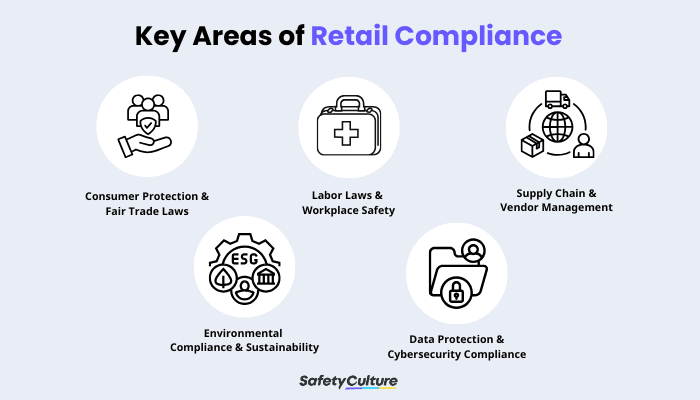Retail Compliance Guide: How to Stay Ahead of Regulations
Learn the essentials of retail compliance, including key regulations, challenges businesses face, and best practices to ensure legal and operational success.

Published 28 Apr 2025
Article by
5 min read
What is Retail Compliance?
Retail compliance refers to the organization’s adherence to the holistic regulatory landscape governing the retail industry. It ensures ethical, lawful, and efficient business conduct, safeguarding the interests of consumers, employees, and the company. This multifaceted framework includes occupational health and safety, consumer protection, labor laws, data privacy and security, and environmental preservation.
Importance
The earliest regulatory compliance frameworks focused on public safety and consumer protection—both covered in managing retail businesses. As compliance programs expanded beyond those areas and became more complicated due to globalization and technological advancements, compliance in retail has become more challenging.
Despite the challenges companies will face, acting in accordance with these regulations will result in the following:
Guaranteed consumer rights and safety – Enforcing laws (e.g., fair pricing, product safety , honest advertising) ensures that patrons and potential customers are treated fairly and safe from harm.
Enhanced workplace safety – Labor laws and safety rules aim to uphold workers’ well-being. Providing basic training and PPE to installing ergonomic workstations prevents accidents and illnesses, increasing employee satisfaction.
Minimized supply chain disruptions – Staying updated with retail compliance regulations helps companies become more proactive with existing retail risks , potential threats, and uncertainties.
Lower chances of legal issues, penalties, and fines – Following all retail-related rules and regulations lessens the possibility of getting involved in costly lawsuits that may ruin the company’s public esteem.
Improved brand reputation – Customers are increasingly conscious of ethical and sustainable practices . Businesses that comply with relevant laws gain positive word-of-mouth, favorable reviews, and media coverage.
Secure Your Retail Success
Simplify store oversight, improve decision-making, and boost growth with an all-in-one platform for every aspect of your retail business.
Key Areas of Retail Compliance
Compliance in the retail industry is challenging because of its diverse and interconnected aspects. Become acquainted with the following to prepare business owners, compliance managers, operations executives, and risk management teams for specific requirements:

Key Areas of Retail Compliance
Consumer Protection and Fair Trade Laws
Customers should be protected from unfair, deceptive, or fraudulent practices. Laws ensure fair pricing, honest advertising, and product safety. Retail giant Walmart has been accused of predatory pricing and inconsistent unit pricing, resulting in millions of dollars in settlement claims. These are some retail compliance requirements:
Pricing accuracy and transparency
Return and refund policies
Truthful advertising (Federal Trade Commission and Advertising Standards Authority)
Product safety (Food and Drug Administration and Consumer Product Safety Commission)
Labor Laws and Workplace Safety
Employees should also have protections, from getting fair wages to enjoying safe working conditions. This set of laws aims to improve workplace standards and prevent exploitation. World-renowned Starbucks was sued for different labor violations, from threatening employees who unionize to awful working conditions in farms. Take note of the following:
Minimum wage and overtime pay
Work hours and breaks
Child labor laws
Workplace safety conditions (US OSHA, UK HSE, etc.)
Anti-discrimination and harassment policies
Supply Chain and Vendor Management
Third-party vendors and service providers should also adhere to the ethical, legal, and safety standards that the parent company follows. Many luxury fashion brands have been investigated for using suppliers linked to forced labor, leading to boycotts and long-term reputational damage. Take note of the following to uphold retail compliance regulations:
Specific considerations:
Product sourcing regulations (CPSC, FTC)
Anti-corruption and bribery policies (Foreign Corrupt Practices Act)
Environmental Compliance and Sustainability
Retailers should also minimize their environmental footprint by following sustainability regulations to reduce waste and emissions throughout their product’s lifecycle. Some companies have pledged to reach net-zero carbon emissions or committed to switching to renewable energy. Consider the following to ensure compliance:
Waste management and recycling (Environmental Protection Agency)
Energy efficiency standards (EPA, American Council for an Energy-Efficient Economy)
Sustainable sourcing
Data Protection and Cybersecurity Compliance
With the rise of e-commerce and digital payments, retailers must protect customer data from breaches, fraud, and misuse through strict cybersecurity management. Hackers have attacked companies and gained access to the personal information of millions of customers. Here are some considerations for retail regulatory compliance:
Payment security compliance (Payment Card Industry Data Security Standard or PCI DSS)
Data privacy laws (General Data Protection Regulation, California Consumer Privacy Act, etc.)
Create your own compliance audit checklist
Build from scratch or choose from our collection of free, ready-to-download, and customizable templates.
Common Challenges and Best Practices to Overcome Them
The sheer number of laws and regulations and the constant changes those undergo make compliance very demanding. Navigating the following challenges requires hard work coupled with innovative solutions.
Managing compliance across multiple locations – Many retail businesses operate in various cities, regions, and countries. It is difficult to apply policies consistently when legal requirements vary across locations. Aside from standardizing policies and procedures and adapting them when needed, conducting regular retail compliance audits helps track compliance performance.
Handling emerging tech-related risks – The rise of e-commerce and digital payments exposed retailers to cybersecurity threats. Adopting strong cybersecurity policies aligned with current data protection laws is the best way to avoid scams and prevent breaches. Retail compliance software can strengthen defenses and identify vulnerabilities immediately.
Keeping up with changing regulations – While this is an inherent challenge, remember that governments update laws regularly to protect the general public. Retail compliance management solutions with regulatory horizon scanning tools and automated policy updates are the best solution.
Improve Retail Compliance with SafetyCulture
Why Use SafetyCulture?
SafetyCulture is a mobile-first operations platform adopted across industries, such as manufacturing, mining, construction, retail, and hospitality. It’s designed to equip leaders and working teams with the knowledge and tools to do their best work—to the safest and highest standard.
Proactively address current risks and emerging ones through real-time monitoring and reporting. Ensure policy enforcement across sites by facilitating transparent audits and inspections. Automate tracking, maintenance, and submission of regulatory requirements to relevant agencies, preventing legal and reputational issues. Accomplish all those while upholding operational efficiency through a unified platform.
Save time and reduce costs
Stay on top of risks and incidents
Boost productivity and efficiency
Enhance communication and collaboration
Discover improvement opportunities
Make data-driven business decisions
FAQs about Retail Compliance
Related articles
Retail

Comprehensive Guide to Category Management Training
Discover the benefits and key topics covered in category management training, and equip your team with essential skills for effective category management.
Retail

How to Prevent Stockouts and Inventory Gaps
Learn how to prevent stockouts with effective inventory management strategies and prevent lost sales and unhappy customers.
Retail

Retail Waste Management: Best Practices for a Sustainable Future
Learn strategies and best practices in retail waste management to help your business reduce waste, cut costs, and improve sustainability.